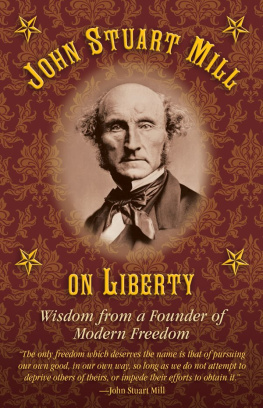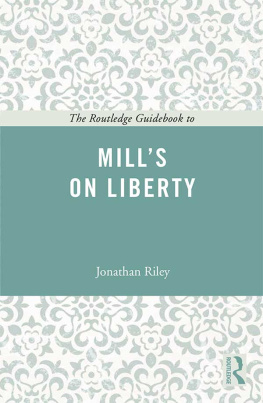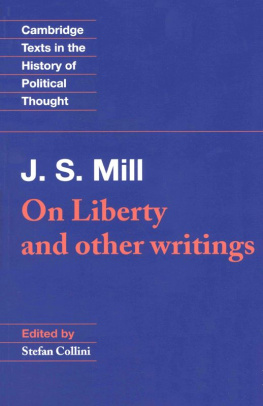J. S. Mill on Civilization and Barbarism
Also by Michael Levin
Marx, Engels and Liberal Democracy
The Spectre of Democracy. The Rise of Modern Democracy as Seen by Its Critics
The Condition of England Question. Carlyle, Mill, Engels
First published 2004
by Routledge
11 New Fetter Lane, London EC4P 4EE
Simultaneously published in the USA and Canada
by Routledge
29 West 35th Street, New York, NY 10001
Routledge is an imprint of the Taylor & Francis Group
This edition published in the Taylor & Francis e-Library, 2004.
To purchase your own copy of this or any of Taylor & Francis or Routledges collection of thousands of eBooks please go to www.eBookstore.tandf.co.uk.
2004 Michael Levin
All rights reserved. No part of this book may be reprinted or reproduced or utilized in any form or by any electronic, mechanical, or other means, now known or hereafter invented, including photocopying and recording, or in any information storage or retrieval system, without permission in writing from the publishers.
British Library Cataloguing in Publication Data
Levin, Michael, 1940
J.S. Mill on civilization and barbarism
1. Mill, John Stuart, 18061873 Views on civilization 2. Civilization, Modern 19th century 3. Civilization, Modern 18th century 4. Culture
Library of Congress Cataloging-in-Publication Data
Levin, Michael, 1940
J.S. Mill on civilization and barbarism / Michael Levin,
p.cm.
Includes bibliographical references and index.
1. CivilizationPhilosophy. 2. Mill, John Stuart, 18061873Views on civilization. 3. Mill, John Stuart, 18061873. On liberty I. Title.
CB19.L398 2004
901dc22
2003055857
ISBN 0-203-32930-9 Master e-book ISBN
ISBN 0-714-65590-2 (hbk)
ISBN: 0-714-68476-7 (pbk)
We have a warning example in China they have become stationary have remained so for thousands of years.
Acknowledgements
I am most grateful for the help and encouragement I have received from James Burns, Gregory Claeys, Janet Coleman, John Day, Clive Hill, Barbara Ballis Lai, Nirmala Rao and Georgios Varouxakis.
None of them, of course, bears any responsibility for the errors that remain.
Chronology
1806 20 May: John Stuart Mill born in London.
1809 First meeting of Bentham and James Mill.
182021 First visit to France.
1823 Starts employment at India House.
Forms Utilitarian Society.
182627 Mental crisis.
1828 Promoted at India House.
1830 Meets Harriet Taylor.
183132 Spirit of the Age.
1832 Death of Bentham.
1835 Reviews first volume of Tocquevilles Democracy in America.
1836 Promoted at India House.
Death of James Mill.
1838 Bentham essay.
1840 Coleridge essay and review of second volume of Tocquevilles Democracy in America.
1843A System of Logic.
1845 Claims of Labour.
184647 Articles in Morning Chronicle on the Irish famine.
1848The Principles of Political Economy.
1851 Marries Harriet Taylor.
1856 Promoted to Chief Examiner of India Correspondence.
1858 Retires from East India Company.
Death of Harriet Taylor Mill.
1859On Liberty.
1861Considerations on Representative Government.
Utilitarianism.
1865 Elected Liberal MP for Westminster.
Auguste Comte and Positivism.
1867 Proposes amendment to the Reform Bill to give votes for women.
1868 Loses seat in Parliament.
Retires to Avignon.
1869Subjection of Women.
1870 Completes Autobiography.
1873 7 May: Dies at Avignon.
1879 Chapters on Socialism published.
Chapter One
Introduction
John Stuart Mill is remarkable not merely for the quality of his intellect but also for the breadth of his concerns. His writings cover the fields of philosophy, politics, economics, sociology, religion and psychology. This particular study derives from an initial interest in his political theory. Within that field scholarship has tended to concentrate around a few key issues. First there is the question of how Mill adapted his utilitarian heritage; of whether his suggested modifications reform or undermine it. Related to this is the question of whether On Liberty, his most famous work, is compatible with his professed utilitarianism or whether it is based on other principles. Second, there is Mills attempted defence of individuality against both society and the state. This question involves the adequacy, or otherwise, of Mills famous distinction between self- and other-regarding actions. Third, there is discussion of where, if anywhere, to draw the line on free expression. Fourth, in his Autobiography Mill declared his adherence to a qualified socialism, without saying precisely what the qualifications were. Fifth, the connection between Mill and liberalism has been much discussed, and is an issue to which I shall turn in the final chapter.
Here I shall suggest that the categories of relevance within which we place a thinker put the focus on certain issues concerning them and so necessarily downgrade or exclude others. In political theory we too easily ignore Mills major contribution to economics. His Principles of Political Economy went through seven editions in his lifetime and was probably the major British economics textbook of the second half of the nineteenth century. Mill is also famous for the early and severe education that his father imposed upon him. He did not go out to school and so had minimal contact with other children. He was reading Greek and Latin at an age when other boys were sent outdoors to get some fresh air and exercise. His education, presumably, gave him his life-long commitment to education as such, and so he is well known for his concern with individual development.
What is relatively neglected, and what we shall here discuss, is that Mill showed an equal commitment to societal development and so can be placed in the discourse associated with such contemporaries as Comte and Tocqueville, with both of whom he corresponded, and with Marx, of whom he had almost certainly never heard. Like them he examined the mechanisms and the paths along which societies had developed from barbarism to civilization. For Mill personal and social development were parallel concerns. In both instances he looked for improvement. The individual has to be educated towards the higher pleasures, the society to civilization. The civilizing process, then, is necessary to both the individual and the society.
On the issue of Mill and civilization it is surprising how little interest there is in his belief that, at the height of its global power, Britains civilization was coming to a standstill. It was the most serious charge that Mill ever made against his own society; not that you would know it from the secondary commentary.
FROM PHILOSOPHY TO POLITICS
One recent discussion of Mills reputation states that Most commentators accord him a representative position in nineteenth-century Victorian liberalism. Another describes him as the most celebrated liberal intellectual. supports this emphasis as, to an extent, does the nature of his own upbringing and life. Mills Autobiography,












